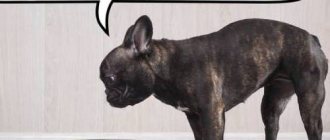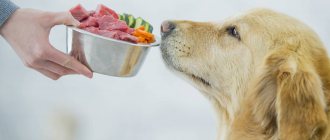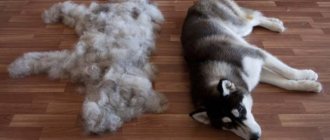Photo by Alvan Nee on Unsplash
The Spitz is a decorative breed that, due to the special anatomy of the nasopharynx, is prone to tracheal collapse and reverse sneezing. Grunting is a common occurrence for a pet, but a preventive examination at a veterinary clinic should be performed twice a year. Only a veterinarian can determine why a Spitz grunts loudly, because the causes of such sounds can be pulmonary, vascular, oncological diseases, or mechanical injuries.
Like I was choking
Often the dog coughs as if he was choking on something after a long walk or meal. The Spitz seems to be trying to cough up a foreign object from its throat. It is worth making sure that the dog has not really choked on a foreign object or piece of food - look into the mouth.
When breathing is compressed by a foreign object, the dog runs, fusses, and begins to salivate. Vomiting may begin. If this factor is excluded, you need to look for other reasons.
It is worth noting here that small breed dogs tend to have a constant cough when they are nervous. This is due to the fact that the cartilages of the Spitz's larynx have an open ring shape and cause spasm. This can happen while eating or actively moving.
It is necessary to calm the pet, pet it, pick it up or give it water to drink. Stroking the throat from top to bottom using gentle, smooth movements will also help.
Important! A smoking owner should prevent their pet from inhaling tobacco smoke.
Situations when grunting is an alarming symptom
Now let’s look at why a dog grunts with its nose, if it’s not a short muzzle or fear, it’s not hot outside, childbirth is out of the question, and there’s no unpleasant smell nearby:
- Rhinitis of a bacterial or viral nature
- a runny nose is one of the most common reasons why dogs grunt and sniffle, sneeze, and snore in their sleep. Other signs of rhinitis are the discharge of yellowish or greenish snot from both nostrils, the appearance of dried crusts on the tip of the nose, lacrimation, loss of appetite; - Foreign body in the nose
[1] – a dog snores and grunts if something is stuck in its nostrils (for example, a small sharp pebble, bead or feather). With such a problem, in addition to noisy breathing and unusual grunts, there will be the following symptoms: flow of tears, frequent sneezing, congestion in one nostril, discharge of clear snot or pus (sometimes with blood), itching (the dog often scratches its nose with its paw), restlessness. By the way, it’s not uncommon for a dog to grunt its nose as if it’s choking. This may be caused by a foreign object (such as a bone) stuck in the pharynx or larynx - Polyps in the nose
- the dog snores and grunts even in situations where there are benign growths on the mucous membrane of the nasal passages. Inflammatory processes in the nasal sinuses, allergic rhinitis, and structural disorders of the nasal cavity often lead to the formation of polyps. Signs of such a problem include: difficulty in nasal breathing, change in voice when barking, itchy nose, runny nose, sneezing, decreased hearing and/or sense of smell; - Tumors of various types in the nose
- polyps that are not removed in time and chronic inflammation of the nasal mucosa often lead to cancer. It is possible to determine that an animal has cancer by the following signs: discharge of ichor or pus from the nostrils, the formation of painful ulcers on the nose, increased body temperature, decreased hearing, pain in the nose, refusal to eat and sudden weight loss; - Allergies
[1] – some dogs are very sensitive, for example, to medications, pollen, dust, and certain types of foods. With allergies in animals, the whole body itches strongly, there is a lot of hair loss, clear exudate flows from the nose, profuse lacrimation occurs, and a lot of dandruff often forms on the skin. In some situations, diarrhea may occur; - Heart attack
- when the functioning of the heart and blood vessels is disrupted, dogs grunt, breathe heavily and frequently, cough, cannot find a comfortable position, and whine pitifully. They sit for a long time with their front legs spread apart and their mouths open. The tongue turns blue during an attack, as do all mucous membranes; - Tracheal collapse
[1] – the dog grunts with its throat, wheezes and desperately coughs dryly when the respiratory lumen is narrowed, caused, for example, by breed predisposition (especially common in dogs of small breeds like Chihuahuas or Yorkshire terriers), obesity, heart failure, pneumonia. Signs of tracheal collapse include (in addition to the symptoms mentioned above): shortness of breath, pallor of the mucous membranes, attacks of suffocation, lethargy and refusal of the most favorite treats; - Pulmonary edema
- this problem can be caused by serious illnesses, for example, kidney or heart failure, poisoning or persistently high blood pressure, blood poisoning. Signs of pulmonary edema include: depression, refusal to eat, frequent noisy breathing with wheezing and grunting, dry cough, decreased body temperature, pallor of the mucous membranes, the appearance of pinkish foam from the nose and/or mouth; - Heartworms
- some helminths parasitize in the pulmonary artery and heart valves of unfortunate animals, which leads not only to grunting, but also other unpleasant symptoms: severe coughing and hoarse breathing, shortness of breath, fatigue, decreased appetite, vomiting (possibly with blood clots), arrhythmias, the appearance of hematomas on the skin and an increase in chest volume; - Stress
– Dogs can grieve and worry just as much as their owners. What can cause a stressful situation? For example, the death of a beloved friend (one of the family members or another pet living in the house), moving, renovation, and much more. Symptoms of stress in dogs include: complete apathy or unexplained agitation, running in circles tirelessly, refusing to eat, bad behavior (disobedience, marking on the floor or furniture, barking for no reason, howling, etc.), catching non-existent animals. fleas, sleep disturbances, licking hair to bald spots.
Wheezes or sneezes
Wheezing, sneezing, or “humming” sounds when coughing may indicate an infectious disease in your Spitz.
A common diagnosis is “ kennel cough .” It occurs in pets with weak immunity when in contact with other dogs, for example, in a kennel or at a show. The diagnosis is made by a veterinarian and treatment is prescribed. Bronchitis, including chronic bronchitis, can also be diagnosed in a Spitz.
You should also be wary of tracheal collapse , a chronic disease that often occurs in small breeds. The cause of its occurrence is a genetic deformation of the tracheal rings, during which the trachea becomes denser and modified. As a result, the lower and upper parts of the trachea come into contact.
This disease cannot be ignored - it can lead to the death of your pet. The diagnosis is made by a veterinarian using hardware diagnostics.
Constant, at night and not only
A constant cough with intensification and severe snoring and snoring at night is a consequence of brachycephalic syndrome , characteristic of dogs with a shortened skull, such as the Spitz.
This is the so-called “soft palate” condition . The soft palate in the back wall is so long that it reaches the respiratory tract, resulting in snoring and coughing. A Spitz may begin to snore and have a specific cough from 3-4 months, and it may get worse in warm, humid weather.
First aid for a dog with signs of suffocation: what can be done before the veterinarian arrives
The owner can provide first aid to a dog with signs of suffocation:
- The dog is immediately given complete rest; it must be isolated from loud noises, small children, etc.
- The air in the room where the sick animal is located should not be excessively dry or humid. We advise you to immediately ventilate and refresh the room.
- If there is a suspicion of asthma, or if your pet suffers from periodic attacks of suffocation of unknown etiology, it is advisable to carry out high-quality wet cleaning of the premises every day. But we do not recommend using chlorine or other “chemicals”, since chemicals can contribute to the development of new attacks.
- If the pet's condition gradually returns to normal, he can be given lukewarm, sweetened water. Just give the drink little by little: as soon as the dog choke, everything will start again. In addition, the animal can choke, choke and die.
Important! Under no circumstances should you hold or otherwise restrain an animal during an attack! If a dog develops severe enough hypoxia, it may well not recognize its owner, and therefore become dangerous.
Severe bites and other injuries in such situations are completely commonplace. To prevent troubles, we can only advise placing a sick pet in a room with a minimum amount of furniture and open corners. Even if the dog “loses control” during an attack, he will not receive serious injuries.
Severe attacks
If your pet has a persistent, severe cough, you need to rule out an allergic cough or a cough due to cardiovascular disease . So, with heart disease, pressure can occur on the bronchi, which causes coughing attacks. This can happen to a dog after six years of age.
You can also notice tachycardia, cyanosis of the mucous membrane, and lethargy . It is necessary to visit a veterinarian who will perform a chest x-ray and listen to the dog's heart.
How to treat dogs of this breed?
As we mentioned earlier, if the cough is caused by nervous excitement, the Spitz should be calmed and given water. But if it is caused by other factors, treatment should be carried out.
- Infectious disease, “kennel cough”, bronchitis – general recommendations include taking an expectorant mixture, vitamins, warm milk with honey, and, if necessary, antibiotics to avoid complications such as pneumonia.
- Collapse of the trachea - the doctor may recommend, if necessary, reducing the dog’s weight, purchasing a special harness-collar, taking medications and drugs that increase immunity. In severe cases, an implant must be installed.
- Allergic cough - the allergen must be eliminated.
- In case of “heart” syndrome , it is worth ensuring the dog’s peace and not subjecting it to excessive stress. A mixture of honey and lemon juice will help reduce a coughing attack: mix 1 tbsp in 200 ml of warm water. a spoonful of honey and half a tablespoon of lemon juice, give the mixture to the Spitz once a day. The veterinarian may also prescribe medications to relieve the severity of the symptom.
- Brachycephalic syndrome - treatment is prescribed by a veterinarian; in severe cases, surgery is performed.
A general diagnosis of the causes of cough in Spitz dogs consists of measuring the temperature, externally examining the dog’s mouth for ulcers and hemorrhages, palpating the trachea, abdominal cavity, and checking the lymph nodes.
Prevention
Any disease is easier to prevent than to cure. Therefore, keep an eye on your pet.
Treatment brings a lot of problems, not only physical, material, but also temporary. Some diseases can be treated within a month, while others cannot be completely cured until the end of the pet’s life.
Follow the general recommendations for the care and maintenance of your Spitz, and there will be no problems with its health.
Regular inspection
Regular periodic examination is mandatory for the presence of various signs that characterize the health of the pet:
Fluffy puppy
- mucous membranes;
- skin;
- wool;
- general activity and motor skills.
Important ! If at least one of the indicators is abnormal, contact your veterinarian.
Visit to the veterinarian
Periodically take your baby to the veterinarian for examination. Preventive diagnostics should be regular so that the disease can be recognized at an early stage.
At the veterinary clinic
You should visit the veterinary hospital at least twice a year, and preferably once every season.
Causes in puppies
At a young age, Spitz are most susceptible to “kennel cough . As a rule, it appears on the 2-3rd day, when the puppy is brought into the house, that is, after the incubation period has passed.
The prognosis for treatment of this disease is favorable, but it is worth visiting a veterinarian. He will prescribe special treatment with expectorants that are acceptable for the puppy.
Attention! It is important to vaccinate the animal on time and take a course of anthelmintic drugs. But vaccination can only be done during a period when the animal is healthy.
Treatment in clinical and home conditions: features and recommendations
Firstly, you must immediately decide on one important nuance: in case of more or less serious diseases of the respiratory system, we would strongly advise against resorting to “self-medication”. So in cases where the question arises about which conditions for therapy to choose, i.e. treatment in clinical and home conditions, you should always prefer a professional clinic. There is very little you can do at home:
- In mild cases, expectorants, anti-inflammatory drugs, antibiotics and other antimicrobial drugs, anthelmintics, etc. are given.
- Sometimes the owner himself can give an asthmatic dog inhalation, but nothing more.
Clinical treatment directly depends on the type of pathology, and we have already written about many aspects above:
- In oncology, if there is at least some possibility of removing the tumor, surgery is required. Otherwise, intensive chemotherapy and radiotherapy.
- For asthma, antispasmodics, antihistamines and other specific medications are used.
- The most difficult thing is with tracheal collapse. In the first two stages, you can still get by with antitussive medications and anti-inflammatory corticosteroids, but as the disease progresses, they all become completely meaningless. The only solution is an expensive operation, during which the veterinarian will install implants, strengthening the animal’s “native” trachea.
- In case of “harmless” parasitic infestations (more precisely, in advanced cases), it is sometimes necessary to resort to surgery. There are cases when a dog’s lungs are literally “exhausted” by numerous parasite larvae, and only a timely operation can save the life (and even partially the health) of the dog.
- For pneumonia and bronchitis, the pet is prescribed a course of powerful broad-spectrum antibiotics, droppers, anti-inflammatory corticosteroids, etc. are indicated.
Finally, I would like to warn breeders that timely contact with a veterinarian plays a huge role.
If the dog can no longer breathe and instead of lungs he has a couple of “bags” of pus, then even the best clinic cannot help him. In cases where the owner turned to specialists on time, there is every chance of getting by with little bloodshed. This way the dog will be healthier, and the funds for his treatment will be spent an order of magnitude less.










